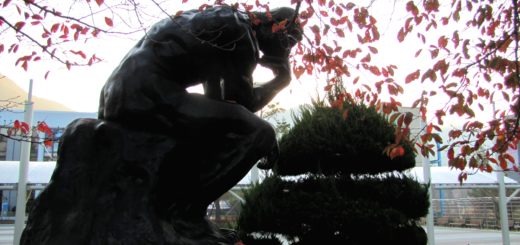Random Reflections on Where We Are Today
To despise and vilify millions of fellow human beings as one’s enemy and a force to be defeated and eliminated, on the basis of disagreements about practical matters, is implicitly to despise and vilify oneself. For who among us has not significantly altered his own beliefs and attitudes over the course of adulthood, such that his own past views and statements might strike him as objectionable, or even revolting — and therefore embarrassing — seen from his current point of view? Perhaps this in itself explains much of the vehemence and unblinking anger endemic to today’s political tribalism. This general will to the destruction, to the obliteration, of the opposing tribe, may be an inadvertent revelation of unreconciled shame, or of awareness of a persistent feeling of hypocrisy, or of desire to immerse oneself in one’s immediate present as a desperate means of burying the evidence.
Every single time you hear anyone speak of the horrible societal cost of the pandemic, or the economic or educational damage wreaked by Covid-19, you may be certain that you are either listening to a committed obfuscator or an illogical dupe. For it was never the virus, but the collective and global government response to the virus, that destroyed economies; flat-lined education; prodded millions of the lonely and troubled into desperation and suicide; demolished the life savings and small business dreams of so many men, women, and families; and furthered the dream of all authoritarians throughout history to separate citizens from one another, and antagonize them toward one another, by promoting the idea that one’s neighbor is a greater existential threat than one’s ruler, and hence that the safety of isolation trumps the freedom of association.
During the past couple of years (hm, what was unusual about these recent years?…let me see…), something peculiar has happened on the roads in the medium-sized Korean city where I live. Specifically, a substantial percentage of drivers, and I mean more than half according to my daily observation, have simply stopped using their turn signals.
This was never a noticeable problem in the past, and I have lived in this city for fifteen years. But quite suddenly, and with increasing commonness, drivers are now approaching even the busiest intersections, as well as residential corners with many pedestrians, without turning on their signal lights to indicate a turn, but then just abruptly turning, as though signalling were a thing of the past.
Whatever its specific causes, it is certain that this behavior demonstrates a complete loss of consideration or courtesy toward other drivers, as well as pedestrians — more plainly stated, toward other human beings in general. There has been a total breakdown of the normal, longstanding sense of responsibility toward others which naturally caused people to follow those rules in the past, with near-perfect consistency. Given the short period of time in which the change has occurred, it is clear that we are, on the whole, talking about the very same drivers who once used their turn signals properly and without hesitation, but who now, all of a sudden, no longer believe they owe a moment’s thought to the safety and convenience of their fellow human beings.
A turn signal is a form of communication, a way of letting others know what you are doing in order to keep everyone informed and secure. The mass rejection of this standard of behavior thus represents a rejection of the norms and purposes of everyday human communication, which is to say everyday human contact. People have been trained, somehow (hm, I wonder how…), not to care a whit about one another’s existence anymore, but rather to see their fellow citizens as nothing but obstacles, inanimate objects of no concern. I see the change in a hundred forms all around me. But as a pedestrian, I am particularly inclined to notice and, shall we say, have an interest in, this flippant disregard for ordinary road safety from my neighbors, even here, in a country noted for its collective compliance with rules of all sorts.
I suppose there is a breaking point, even among the most submissive and obedient of peoples; a level of demeaning mass emasculation beyond which the urge to express one’s non-compliance — not against the state, of course, but against one’s neighbors — might burst forth in the most irrational and destructive ways. We have certainly seen plenty of evidence of this throughout the world in recent years. “The pandemic,” however, has brought this moral and social crisis down to the level of the lowest common denominator, namely the level of ordinary coexistence.


